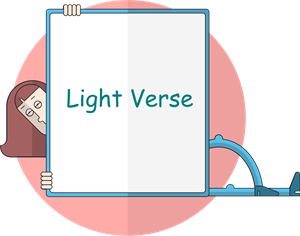PDF chapter test TRY NOW
Light verse is a kind of poetry that contains trivial, playful, or frivolous themes. The primary aim of such poetry is to entertain its readers.

Characteristics of a light verse:
- The poems are usually brief.
- Their target audience are children.
- The language is simple, and the poems are easy to read and understand.
- The subject/theme are mostly nonsensical and cannot be taken seriously.
- The poem often contains wordplay such as puns, striking rhyme, and heavy use of alliteration.
- Sometimes, the poems might also contain words coined by the poet. The terms often seem senseless when used outside the context.
Various writers explored and championed light verse. Some of the famous exponents were Lewis Carroll, W. H. Auden, Edward Lear, Alexander Pope, and Shel Silverstein.
The term ‘light verse’ is also used to identify the poetic forms such as nonsense poetry, mock-epic, etc.
Read more about light verse here.
Example:
The following example of a light verse is an extract from Edward Lear's "The Owl and the Pussy Cat"**:
The Owl and the Pussy-cat went to sea
In a beautiful pea-green boat,
They took some honey, and plenty of money,
Wrapped up in a five-pound note.
The Owl looked up to the stars above,
And sang to a small guitar,
"O lovely Pussy! O Pussy, my love,
What a beautiful Pussy you are,
You are,
You are!
What a beautiful Pussy you are!"
In a beautiful pea-green boat,
They took some honey, and plenty of money,
Wrapped up in a five-pound note.
The Owl looked up to the stars above,
And sang to a small guitar,
"O lovely Pussy! O Pussy, my love,
What a beautiful Pussy you are,
You are,
You are!
What a beautiful Pussy you are!"

Edward Lear's illustration of "The Owl and the Pussy Cat"
Important!
Click here to read the rest of the poem "The Owl and the Pussy Cat".
"Macavity: They Mystery Cat" as Light Verse:
Macavity’s a Mystery Cat: he’s called the Hidden Paw —
For he’s the master criminal who can defy the Law.
He’s the bafflement of Scotland Yard, the Flying Squad’s despair:
For when they reach the scene of crime — Macavity’s not there!
For he’s the master criminal who can defy the Law.
He’s the bafflement of Scotland Yard, the Flying Squad’s despair:
For when they reach the scene of crime — Macavity’s not there!
Macavity, Macavity, there’s no one like Macavity,
He’s broken every human law, he breaks the law of gravity.
His powers of levitation would make a fakir stare,
And when you reach the scene of crime — Macavity’s not there!
You may seek him in the basement, you may look up in the air —
But I tell you once and once again, Macavity’s not there!
He’s broken every human law, he breaks the law of gravity.
His powers of levitation would make a fakir stare,
And when you reach the scene of crime — Macavity’s not there!
You may seek him in the basement, you may look up in the air —
But I tell you once and once again, Macavity’s not there!
Macavity’s a ginger cat, he’s very tall and thin;
You would know him if you saw him, for his eyes are sunken in.
His brow is deeply lined with thought, his head is highly domed;
His coat is dusty from neglect, his whiskers are uncombed.
He sways his head from side to side, with movements like a snake;
And when you think he’s half asleep, he’s always wide awake.
He sways his head from side to side, with movements like a snake;
And when you think he’s half asleep, he’s always wide awake.
Macavity, Macavity, there’s no one like Macavity,
For he’s a fiend in feline shape, a monster of depravity.
You may meet him in a by-street, you may see him in the square —
But when a crime’s discovered, then Macavity’s not there!
You may meet him in a by-street, you may see him in the square —
But when a crime’s discovered, then Macavity’s not there!
T. S. Eliot's "Macavity: The Mystery Cat" is a light verse because:
- As seen in a light verse, the poem also has children as its target audience. To recall, the poem, along with the others from the collection "Old Possum's Book of Practical Cats", was written for T. S. Eliot’s godchildren.
- The language used in the poem is simple and direct. Except for a phrase or two, such as "For he’s a fiend in feline shape" and " a monster of depravity", the poem is easy to be read and understood. One should remember that Eliot wrote the poem for an audience that spoke English as their first language. Hence, certain words that may seem difficult for us are likely to be a part of their day-to-day vocabulary.
- While the poem may not be categorised as 'brief', it is not long either. The length of the poem is kid-friendly.
- The subject of the poem is nonsensical. There is no way that one could find a real cat that fits the description of Macavity.
- There is a strong use of rhyming words, repetition, and alliteration in the poem. These elements make the poem pleasing and attractive to the young audience.
- The poem contains a word coined by Eliot: Macavity. Eliot drew the inspiration for the name and the characterisation from the character "Moriarty".
Reference:
